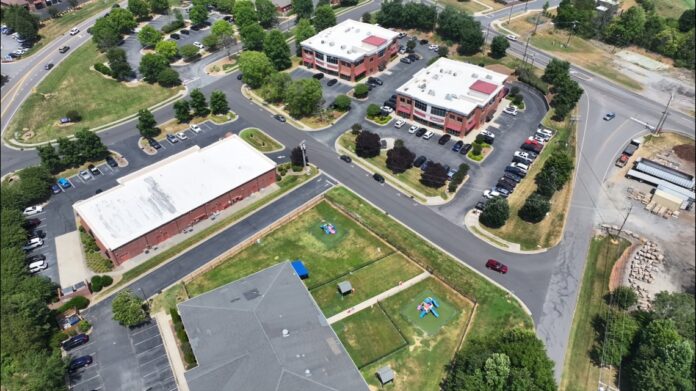State records identify up to 100,000 tons of coal ash, a coal-burning byproduct that contains toxic ingredients, under and around Tutor Time of Mooresville.
MOORESVILLE, N.C. — As the summer sun beams down on patches of worn-out grass, 8 miles from the haze of a Duke Energy coal-fired power plant, children’s laughter escapes the chain-link fence that surrounds their day care, unaware that potential cancer-causing toxic materials sit below their feet.
Less than two football fields away, wearing a shirt that reads “Kill Cancer!” Lori Deans shakes her head in anger after finding what appears to be coal ash just below the surface of a nearby median, which is in direct violation of state rules meant to protect the public. State and federal regulators require coal ash to be at least a foot-and-a-half below the surface.
“Those parents need to be warned”

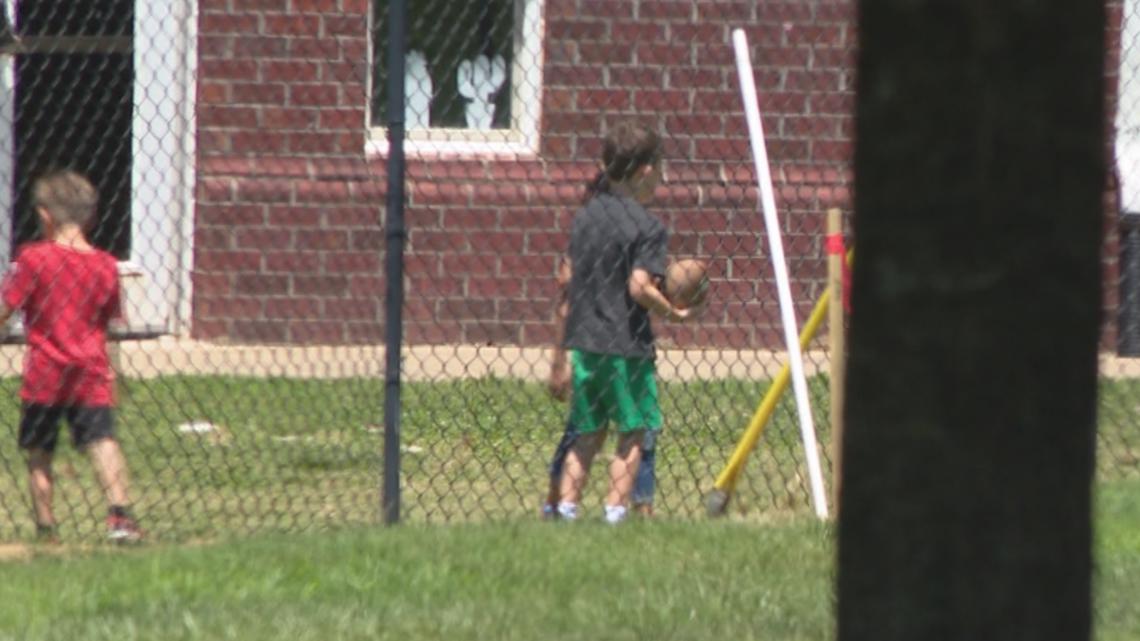
State environmental records Deans found show there’s up to an estimated 100,000 tons of coal ash, the equivalent of the weight of an aircraft carrier, under the Brawley School Road business park. The business park is home to Tutor Time of Mooresville.
“I hit coal ash on the first try,” Deans said. “That’s horrifying. Those parents need to be warned.”
For the mother-turned-advocate, it’s personal. Deans’ 27-year-old son Aaron died in 2021. While we’ll never know if coal ash harmed Aaron, Deans said her son spent the years leading up to a testicular cancer diagnosis digging in the dirt for work.
“I don’t want anyone else to go through what we have,” Deans said.
In an effort to protect others, Deans now dedicates her life to exposing what is in the soil. Depending where she steps in Mooresville, state data analyzed by WCNC Charlotte identify hundreds of thousands of tons of the potentially toxic coal-burning byproduct in the ground, heavily concentrated in the area surrounding Duke Energy’s Marshall Steam Station.
So-called structural fills containing coal ash exist at a minimum of 16 sites in the town, including near Lake Norman High School and under the now-closed Tire Masters business.
Duke Energy downplays dangers

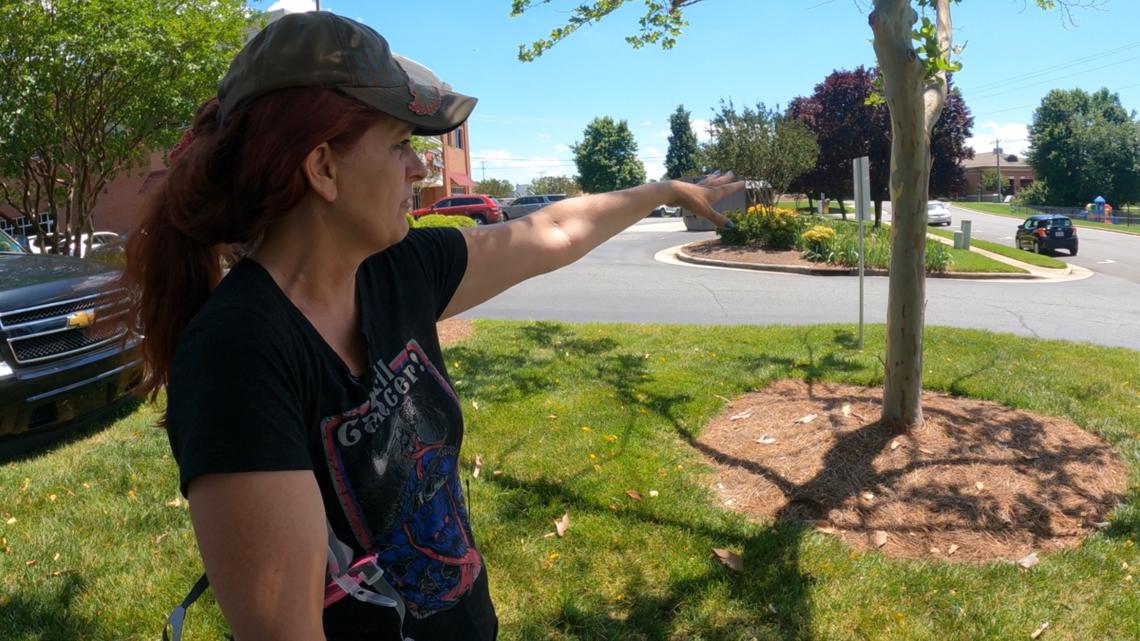
Duke Power legally sold the coal ash decades ago as cheap fill dirt for construction projects, like “under roads, parking lots and other commercial developments,” before scientists learned of the potential danger to humans. When questioned by WCNC Charlotte about the practice today, the utility noted the sale of ash followed state regulations at the time focused on “how ash could be used in ways that are safe for people and the environment.”
Now regulated by the state, the fills are supposed to be deep underground, but Deans discovered what looks like coal ash just below the grass at the business park. During visits to the site, WCNC Charlotte noticed a similar-looking material along the fence line of Tutor Time and near a sidewalk in the business park.
“It’s been downplayed,” a frustrated Deans said. “The dangers have been downplayed.”
“No, I don’t think it’s safe”

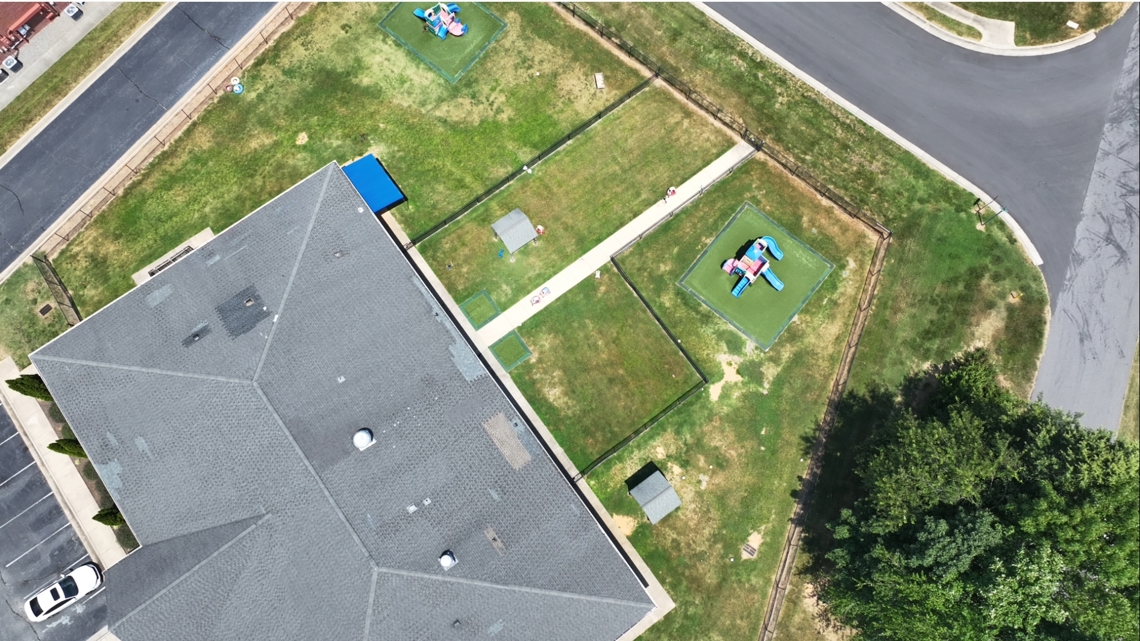
Dr. Julia Kravchenko, an assistant professor of surgery and population health sciences with the Duke University School of Medicine, told WCNC Charlotte she’s alarmed that kids are regularly playing on top of coal ash. Kravchenko said, although costly, the coal ash should be removed.
“I think that it’s unacceptable,” Kravchenko said. “All these territories, they need to be cleaned completely from this coal ash and only after that, it could be used for building something, especially for children.”
The mother has researched the dangers of coal ash.
“Would you let your kids play on top of coal ash?” WCNC Charlotte asked.
“No, I will not let (them) do this,” Kravchenko said. “I think it’s not the way we should promote the health of young generations in this country and other countries as well, because children’s health is our national treasure. It’s the main investment we have and they should have the best environment.”
“Based on what you know about this situation, do you think it’s safe?” WCNC Charlotte asked.
“You mean safe for kids to play on top of the coal ash?” she replied. “No. No, I don’t think it’s safe.”


Kravchenko said scientists continue to learn more about the risk of coal ash to humans, identifying a wide array of potential health impacts, including allergic reactions, asthma in children, emphysema, pneumonia, cardiovascular diseases, stroke, Alzheimer’s disease and dementia, kidney disease, developmental disorders in children, neurological disorders in children, complications in pregnancy and childbirth, low birth weight in newborns and cancers. She said while much of the impact depends on a person’s specific make-up and what is actually in the coal ash, children are especially vulnerable.
“They could be easily contaminated and potentially, they have a much higher risk of developing negative adverse health effects compared to older people,” Kravchenko said. “What is very dangerous is that some of these substances, they could be accumulated and stay in the body for years and years and years and it’s very difficult to take them out.”
EPA warns of coal ash dangers
In addition to the dangers associated with heavy metals in coal ash, like arsenic and radium (known carcinogens), there is also fear of radiation. In the last year, the Environmental Protection Agency warned of increased cancer risks tied to gamma radiation in coal ash. The agency’s October 2023 draft risk assessment of Coal Combustion Residuals (CCR) concluded, “Accumulation of CCR can result in elevated cancer risk from incidental ingestion of arsenic and radium, in addition to direct exposure to gamma radiation from radium.”
In response, more than 150 public interest groups sent a letter urging the EPA to ban “the widespread use of toxic coal ash in place of soil for construction and landscaping projects in residential areas,” specifically referencing Iredell County.
Duke Energy spokesperson Bill Norton said the EPA’s findings “are not reflective of real-world conditions,” made “unreasonable assumptions” and “Even in this unrealistic scenario, the level of radiation in question is less than half the amount of everyday radiation one would experience simply living in a high-elevation city like Denver, Colorado.” He added, the mere presence of “trace amounts of arsenic in coal ash does not equate to a risk to human health or the environment.”
Despite those words, Duke Energy’s own coal ash test results, obtained by WCNC Charlotte, show several cases where the levels of arsenic are much higher than those in the natural soil found in Mooresville. The samples, collected between 2015 and 2019 from the Marshall Steam Station, show some arsenic levels at least more than 10 times higher than background threshold values, according to the data.
“Any amount of arsenic that exceeds the background level is viewed as unacceptable, because it is unsafe,” environmental attorney and chemical engineer Chris Nidel said after reviewing the data at WCNC Charlotte’s request. “That is unsafe and for you to take and put that into fill to be used for housing or fill to be used for a day care, those are levels that under any other circumstance would require cleanup.”


Nidel said while it’s unclear how this coal ash will impact kids at the day care, “it can only be a bad thing.” Building on concerns of accumulation, he said he worries a speck of dust will enter a person through a unique pathway, lodge in their bodies and then radiate over time.
“We are doing an experiment on the health and well-being of people like those kids that are attending a day care,” he said. “Several of coal ash’s ingredients are toxic. I don’t know any other way to say then that makes coal ash toxic.”
Duke Energy’s spokesperson pushed back on Nidel’s analysis of the utility’s own results.
“Having trace amounts of arsenic above background levels does not mean there is a risk to human health or the environment,” Norton emailed.
In 2023, more than 200 contract workers who helped clean up a massive coal ash slurry spill involving a different utility, the Tennessee Valley Authority, reached an undisclosed settlement with their employer. The workers were told the coal ash was safe and were denied personal protective equipment. Their attorneys argued the employees were harmed by arsenic and radium, among other toxic substances. The contractor eventually settled. In the aftermath of the 2008 spill, hundreds of workers became sick and more than 60 died.
One-third of North Carolina’s largest fills are around Mooresville
State records identify a minimum of 8.8 million tons of coal ash in structural fills across at least 70 sites in North Carolina.
“The U.S. EPA has repeatedly studied coal ash and determined it should be regulated as a non-hazardous material,” Norton, the Duke Energy spokesperson, said in an email. “Ash is largely composed of very common elements, such as silica, iron, aluminum and calcium – all trace elements combined comprise less than 1% of coal ash.”
Roughly one-third of the state’s known coal ash in structural fills is located within the 11-county Mooresville office of the North Carolina Department of Environmental Quality, an agency spokesperson told WCNC Charlotte. Despite community concerns, NCDEQ has not expressed fears publicly about the Brawley School Road structural fill, noting “no erosion or exposed ash” found during a monitoring inspection in June 2023.

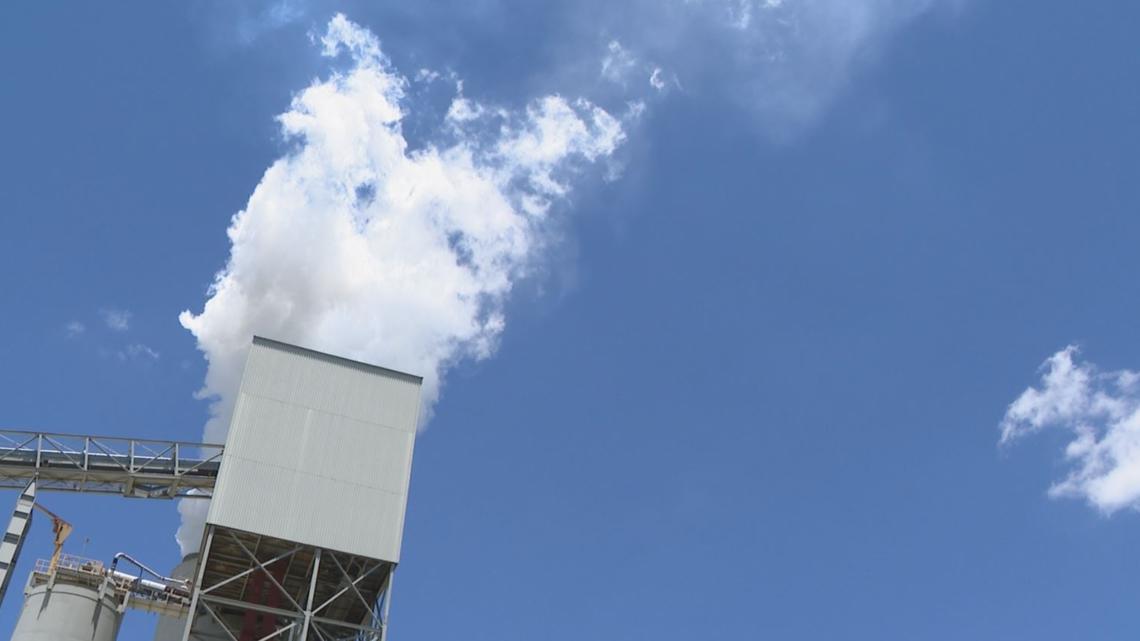
“When properly managed, a coal ash structural fill is closed and maintained to minimize the release of constituents to the environment and prevent the potential exposure pathways of ingestion or inhalation,” DEQ Deputy Secretary for Public Affairs Sharon Martin said in an email to WCNC Charlotte.
State rules require yearly inspections for older structural fills, but DEQ has yet to provide copies of inspections prior to 2023.
Over the course of several recent visits to the site, WCNC Charlotte documented what appeared to be exposed coal ash in multiple locations. As a result, DEQ conducted a follow-up inspection and confirmed “a small area of ash exposed due to tree roots and an area of potential erosion in common landscape areas of the property where foot traffic and the potential for human contact with ash are minimized.” A spokesperson said the agency is working to get those areas repaired as soon as possible.
“Our staff inspected the entire business park and is working with the appropriate owners of the areas that appear to need attention, including Tutor Time (for an area outside of their fence) and Brawley Commerce Park Condo Association,” Martin said.
DEQ Public Information Officer Katherine Lucas added, “there is no acute health or safety risk associated with these small areas of exposed ash in locations of minimal human contact.” She said the agency will continue to work with the property owners “to assess whether any other actions are necessary to identify or prevent future exposures from erosion.” Lucas said if the owners fail to address the concerns, “they would be subject to enforcement action under the applicable rules.”
Tutor Time responds
Tutor Time’s corporate office dismissed health and safety concerns when contacted by WCNC Charlotte in mid-June and has not responded to follow-up emails since.
“The health and safety of the children we serve is our highest priority,” its parent company said in a statement back in June. “Our building was constructed over 20 years ago in partnership with the local building department and following all state requirements. We have no reason to believe that our facility poses any health or safety risk to our students and staff. We have not been contacted by the North Carolina Department of Environmental Quality, who is working to clean up coal-ash sites in North Carolina, about any potential risk or concern, nor is this site listed as a concern for coal-ash.”

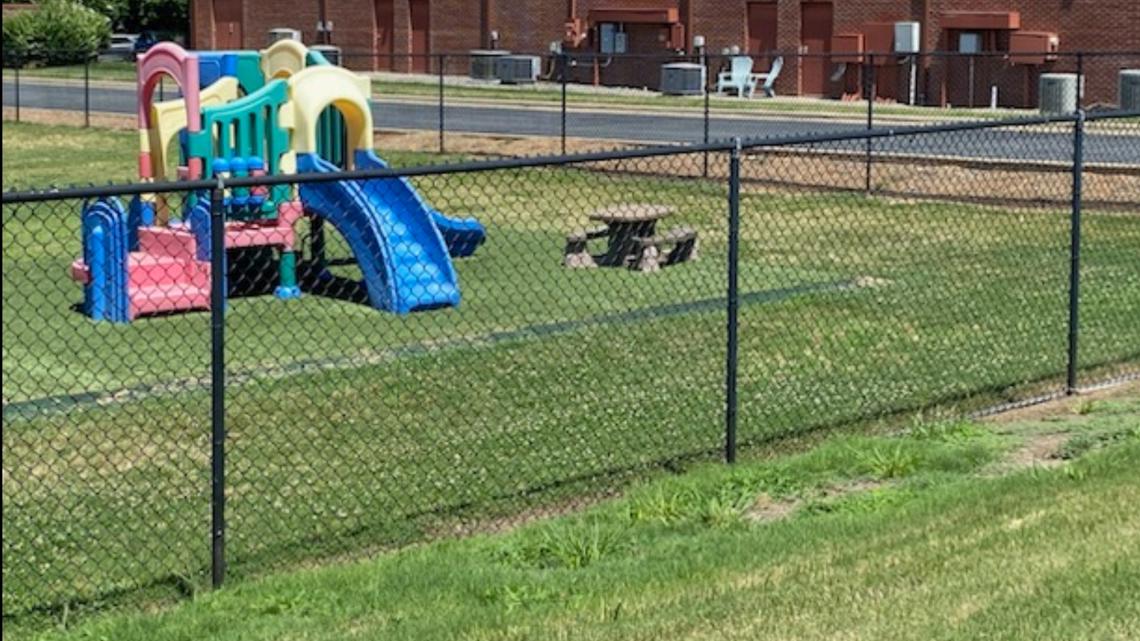
Dr. Kravchenko encouraged regulators to test soil, like the soil under the day care, for coal ash. The last publicly documented test of the coal ash placed at the business park site found low levels of select metals in 1995, including arsenic, chromium and lead, all of which tested below allowable levels. That test did not measure radium, records show.
Since regulators have yet to confirm any tests of the site’s coal ash since, WCNC Charlotte consulted with Duke University Nicholas Chair of Environmental Quality Chair Dr. Avner Vengosh, then donned safety equipment, collected samples from the public right-of-way at the median and sent the sealed samples to the scientist for analysis. Also concerned that coal ash is beneath children’s feet, Vengosh estimated his results would be available by the end of August.
In the meantime, neither Tutor Time’s corporate office nor the local director would answer whether the day care has told parents about the coal ash. While filming on a public street in late June, the director approached WCNC Charlotte, expressing concerns, not about the ash, but instead that news cameras would identify kids.
“Records show (there are) 100,000 tons beneath this area of coal ash. That doesn’t concern you?” WCNC Charlotte asked her as three cameras rolled.
“Really not going to talk about it,” she replied.
“Do the parents know that there’s coal ash under here?” WCNC Charlotte later asked.
“I’m not going to get roped into any of that, but thank you,” she replied before walking away.

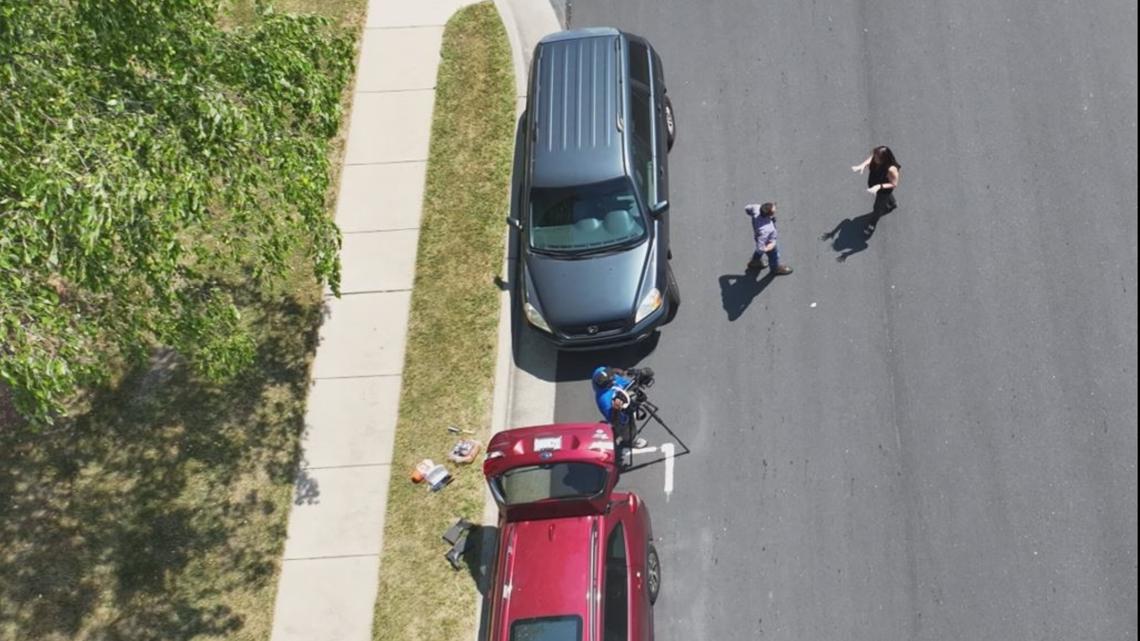
Duke Energy once compared coal ash to a bottle of water
Duke Energy has long dismissed concerns about the dangers of coal ash. In 2019, a WCNC Charlotte investigation focused, in part, on unusually high thyroid cancer rates in Mooresville. A utility spokesperson compared coal ash to a bottle of water.
“Is coal ash toxic?” WCNC Charlotte asked at the time.
“No,” Paige Sheehan, now retired, responded. “If I had a bottle of water here and I would drink a bottle of water, that water is perfectly safe for me. If I were to drink 50, that water would be toxic, because it’s the dose and exposure that makes it toxic. Coal ash is not toxic any more than a bottle of water is.”
“Wait, isn’t it a fact that heavy metals and some carcinogens are in coal ash?” WCNC Charlotte responded.
“Yes, and they’re also in soil and naturally occurring,” Sheehan responded.
At the time, WCNC Charlotte pressed, if coal ash is the same as dirt or water, why then do regulators require coal ash to be covered?
“I’m not suggesting that coal ash is the same as water,” Sheehan said. “I’m saying when you look at toxicity, it’s about dose and exposure. There is a component in coal ash, arsenic, that is a carcinogen. Somebody would have to have a very high exposure rate over a very long period of time, like inhaling it for example, before they might face a health concern.”
In 2024, Duke Energy declined an on-camera interview with WCNC Charlotte and deferred questions about the coal ash below and around Tutor Time to state regulators.
“Property owners retain full responsibility for maintenance to ensure ongoing compliance with state regulations…” Norton said in response to WCNC Charlotte’s interview request. “Our involvement in this project ended decades ago. Since NCDEQ has oversight of such structural fills, the agency would be in the best position to address any concerns about this specific site.”
WCNC Charlotte offered the Brawley Commerce Park Condo Association the opportunity to share a response as well. The association’s board has not yet provided any comment.
“Coal Ash Sacrifice Zone”

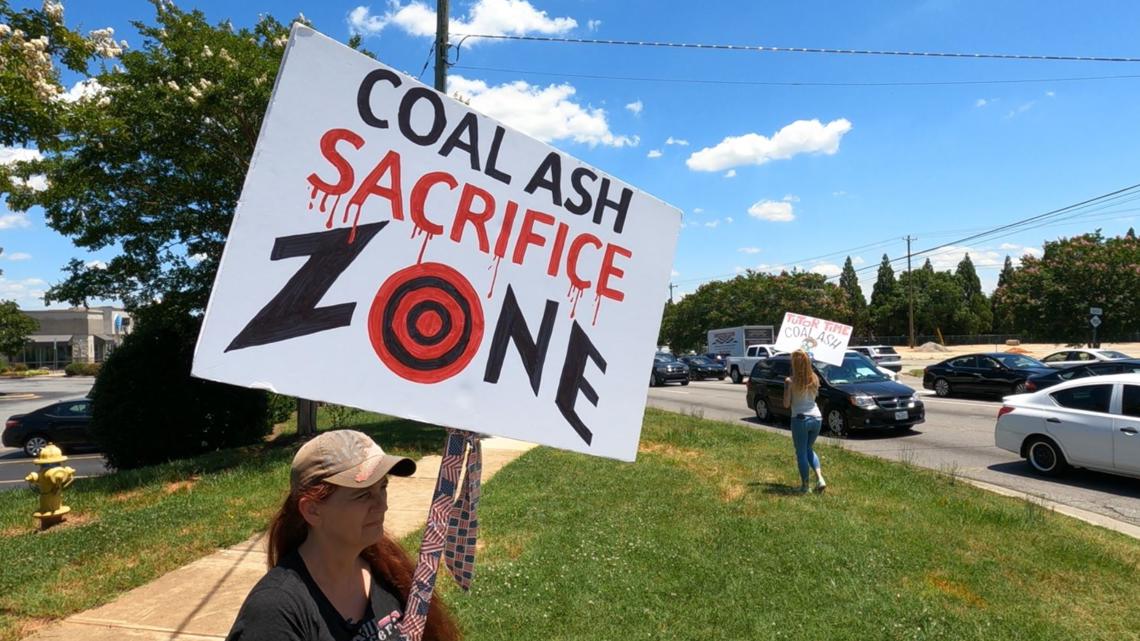
On a busy street corner in Mooresville, holding handmade signs alongside her sister that read “Coal Sacrifice Zone” and “Tutor Time Coal Ash,” Lori Deans is doing everything in her power to make sure the truth is not buried.
“I put signs on the poles to try to warn people and I protest,” Deans said. “I’ll get honks and yells of support, but then I’ll also get screamed at and cussed.”
Deans regularly speaks at Town of Mooresville Board of Commissioners’ meetings during the public comment period. She’s also twice shared concerns publicly with the EPA.
Deans wants people to look beyond the surface of Mooresville’s picturesque backdrop to understand Duke Energy unloaded potentially toxic coal ash in the community, some of it under unsuspecting children.
As she grieves the death of her son, she wants to protect other kids.
“I believe my son would still be alive if he had not grown up around this toxic waste,” Deans said. “He was the light in every room, the funniest person in the world and sweet and smart and he did not deserve any of this. He deserved a future. He did not deserve to live on top of toxic waste and not be warned.”
WCNC Charlotte will air this full report tonight after the Olympics.
Contact Nate Morabito at nmorabito@wcnc.com and follow him on Facebook, X and Instagram.
WCNC Charlotte is committed to reporting on the many issues impacting the communities we serve. We tell the stories of people working to solve persistent social problems. We examine how problems can be solved or addressed to improve the quality of life and make a positive difference. WCNC Charlotte is seeking solutions for you. Send your tips or questions to newstips@wcnc.com.


